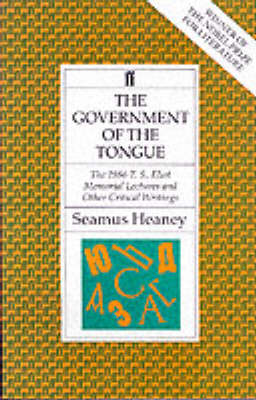14%OFF

Stock image for illustration purposes only - book cover, edition or condition may vary.
The Government of the tongue: The 1986 T S Eliot Memorial Lectures and other critical writings
Seamus Heaney
€ 14.99
€ 12.88
FREE Delivery in Ireland
Description for The Government of the tongue: The 1986 T S Eliot Memorial Lectures and other critical writings
Paperback.
The title, The Government of the Tongue, carries suggestions of both monastic discipline and untrammelled romanticism, and is meant to raise an old question about the rights and status of poetic utterance itself. Should it be governed? Should it be the governor? Seamus Heaney here scrutinizes the work of several poets, British and Irish, American and European, whose work is responsive to such strains and tensions.
The title, The Government of the Tongue, carries suggestions of both monastic discipline and untrammelled romanticism, and is meant to raise an old question about the rights and status of poetic utterance itself. Should it be governed? Should it be the governor? Seamus Heaney here scrutinizes the work of several poets, British and Irish, American and European, whose work is responsive to such strains and tensions.
Product Details
Publisher
Faber & Faber
Format
Paperback
Publication date
1989
Condition
New
Number of Pages
208
Place of Publication
London, United Kingdom
ISBN
9780571141517
SKU
V9780571141517
Shipping Time
Usually ships in 5 to 9 working days
Ref
99-6
About Seamus Heaney
Seamus Heaney was born in County Derry in Northern Ireland. Death of a Naturalist, his first collection of poems, appeared in 1966, and was followed by poetry, criticism and translations which established him as the leading poet of his generation. In 1995 he was awarded the Nobel Prize in Literature, and twice won the Whitbread Book of the Year, for The Spirit Level (1996) and Beowulf (1999). Stepping Stones, a book of interviews conducted by Dennis O'Driscoll, appeared in 2008; Human Chain, his last volume of poems, was awarded the 2010 Forward Prize for Best Collection. He died in 2013. His translation of Virgil's Aeneid Book VI was published posthumously in 2016 to critical acclaim.
Reviews for The Government of the tongue: The 1986 T S Eliot Memorial Lectures and other critical writings
The 20th century saw the emergence of the poet as witnessvoicing solidarity with the doomed, the victimized, the dispossessed. Irish poet Heaney here gauges this trend in essays on Wilfred Owen, Osip Mandelstam, Zbigniew Herbert. He admits that the power of the poem to change the world is almost nil. Then, turning to T. S. Eliot's 'The Waste Land', he affirms the healing value of poetry as its own vindicating force, restoring us to our true selves. Interrelated essays investigate the ways in which W. H. Auden, Robert Lowell and Sylvia Plath each became an 'antenna, ' getting beyond the ego to voice the spiritual yearnings and anxieties of our time. Heaney has a fine ear for Derek Walcott's lush Caribbean verse, which he calls 'a common resource, ' and for 'the wire-sculpture economy' of Miroslaw Holub's games of knowledge. Beautifully written, these essays and reviews reconfirm poets as unacknowledged legislators of the world. - Publishers Weekly
